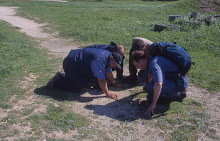.jpg)
In XVIII century, men of power were liberal patrons of arts. Artists often attained a distinguished status and richness under the patronage of kings and churchmen. Caravaggio instead fighted, killed, and ultimately was chased with a price on his head. Why? At the beginning, he was sponsored by the Pope and cardinals, and, although he was rebellious and non-conformist, he was highly appreciated by the sofisticated court of the Pope. His story was similar to that of Velazquez, that strongly criticized the powerful men of the court of Spain, portraying kings as idiots and clowns as noble men, but that was nonetheless higly prized by the same king that he protrayed with such a silly face. The king was telling: "you can paint as you like, as long as your excellence glorifies my power." Caravaggio could not stand that, and I am confident that he tried to escape his golden cage, seeking his miserable end in Malta, chased by the police and with a price on his head.



